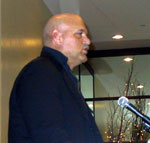Abortion plans complicate GOP plan to cut health, welfare
By Laura McCallum
Minnesota Public Radio
March 12, 2002
Gov. Ventura Tuesday criticized the 'phase two' budget balancing plans moving through the Legislature. Ventura says the House and Senate plans to address the budget shortfall are election-year quick fixes. The two plans have major differences, and several sticking points are obstacles to an agreement.
| |
|
|
|
||
So-called "phase two" is the Legislature's attempt to address a remaining $439 million deficit in the current two-year budget cycle. "Phase one" passed last month over Governor Ventura's objections. It used one-time money and spending cuts to fill the bulk of the budget shortfall - nearly $2 billion.
The Senate's phase two plan uses accounting shifts and borrows for road projects instead of paying cash. The House relies on the state's tobacco endowments and spending cuts.
Gov. Ventura blasted both plans, for different reasons. Ventura told the St. Paul Rotary Club that the House plan uses the tobacco endowments to balance the budget - after that same money was earmarked for cash flow purposes in phase one.
"I don't know about you, but in my 50 years on the planet, I've only been able to spend a dollar once," Ventura said.
Ventura says both the House and Senate fail to deal with the deficit in the next biennium, ignore inflation and have no plan to restore the budget reserves.
"My best guess is that they will work out the final details of a short-term quick fix, and then get out of Dodge before the people figure out exactly what's happened," he said.
The Legislature is not constitutionally required to balance the budget beyond the current biennium. Ventura's proposal to balance the budget through 2005 includes a mix of budget reserves, spending cuts and tax increases.
Senate Democrats say their plan will include temporary tax increases to balance the budget in '04 and '05. Ventura says Republican House Speaker Steve Sviggum and DFL Senate Majority Leader Roger Moe worked out phase one without his involvement. But he doubts their partnership will continue, as the Senate talks about tax increases and the House remains opposed to them.
| |
|
|
|
||
"If this problem doesn't end in the divorce of Roger and Steve, I'll be very surprised. I think a separation will occur first, and then of course at some point someone will file those divorce papers after the separation," he said.
Some rifts are already becoming apparent. In the House, the bill cutting nearly $62 million in health and human services spending now has two abortion-related measures tacked onto it. One is the so-called women's right to know bill that requires a 24-hour waiting period for women seeking abortions. It has been vetoed twice by Ventura.
The other measure would prohibit organizations that provide abortions or refer women for abortions from receiving state money. The Senate phase two plan does not include abortion language.
The chair of the House Health and Human Services Committee, Rep. Kevin Goodno, R-Moorhead, says he's not worried about the threat of a gubernatorial veto over abortion restrictions.
"The governor vetoed the first budget-balancing bill too, so, we'll deal with that when the time comes," he said.
Ventura wouldn't say whether he'd veto a phase two bill that contains abortion language.
Aside from abortion, other differences separate the House and Senate plans. The House taps $310 million of the smoking prevention endowment, which the Senate opposes. And the Senate restores some spending cuts from phase one, while the House makes further cuts.
Health and Human Services takes the biggest hit in the House plan. Minh Ta of the Children's Defense Fund says the cuts affect health insurance for children and general and emergency assistance for low-income adults.
"And these are the programs that serve the most vulnerable, and usually, not the most popular people in society. You know, the folks that are out at the Dorothy Day Center each and every day," Ta said.
Ta says 85 percent of the proposed cuts in the House phase two plan come from health and human services. House Republican leaders say the cuts will be a hardship for some people, but they wanted to spare funding for nursing homes and education.
Legislative leaders have their work cut out for them to find common ground between the two plans, and they'd like to do it quickly. Their goal is still to adjourn by Easter.
More from MPR

